Linnea Tanner's Blog, page 35
August 23, 2021
A. B. Michaels The Art of Love #HistoricalFiction #BlogTour #CoffeePotBookClub @ABMichaelsBooks @maryanneyarde
It is my pleasure to feature A. B. Michaels as part of The Coffee Pot Book Club Blog Tour being held from June 29th – August 31st, 2021. A. B. Michaels is the author of the historical fiction novel, The Art of Love (The Golden City, Book One), which was released by Red Trumpet Press on 4th May 2014 (360 pages).
Below are highlights of The Art of Love, A. B. Michaels’ author bio, and a guest post by her.

FOLLOW THE BLOG TOUR BY CLICKING ART OF LOVE BLOG TOUR
HIGHLIGHTS: THE ART OF LOVE
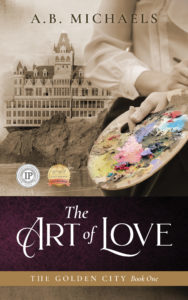
The Art of Love
(The Golden City, Book One)
By A.B. Michaels
Your Journey to The Golden City begins here…
FORTUNE…SACRIFICE…PASSION…and SECRETS
A tale of mystery, social morality and second chances during America’s Gilded Age, The Art of Love will take you on an unforgettable journey from the last frontier of the Yukon Territory to the new Sodom and Gomorrah of its time – the boomtown of San Francisco.
After digging a fortune from the frozen fields of the Klondike, August Wolff heads south to the “Golden City,” hoping to put the unsolved disappearance of his wife and daughter behind him. The turn of the twentieth century brings him even more success, but the distractions of a hedonistic mecca can’t fill the gaping hole in his life.
Amelia Starling is a wildly talented artist caught in the straightjacket of Old New York society. Making a heart-breaking decision, she moves to San Francisco to further her career, all the while living with the pain of a sacrifice no woman should ever have to make.
Brought together by the city’s flourishing art scene, Gus and Lia forge a rare connection. But the past, shrouded in mystery, prevents the two of them from moving forward as one. Unwilling to face society’s scorn, Lia leaves the city and vows to begin again in Europe.
The Golden City offers everything a man could wish for except the answers Gus is desperate to find. But find them he must, or he and Lia have no chance at all.
Buy Links The Golden City Series:
AUTHOR BIO: A. B. MICHAELS

A native of California, A.B. Michaels holds masters’ degrees in history (UCLA) and broadcasting (San Francisco State University). After working for many years as a promotional writer and editor, she turned to writing fiction, which is the hardest thing she’s ever done besides raise two boys. She lives with her husband and two spoiled dogs in Boise, Idaho, where she is often distracted by playing darts and bocce and trying to hit a golf ball more than fifty yards. Reading, quilt-making, and travel figure into the mix as well, leading her to hope that sometime soon, someone invents a 25+ hour day.
Social Media Links:
Website  Twitter
Twitter  Facebook
Facebook  Pinterest
Pinterest  BookBub
BookBub  Amazon Author Page
Amazon Author Page  Goodreads
Goodreads
Gone but not Forgotten: San Francisco’s Amazing Sutro Baths
If you Google “largest swimming pools in the world,” you’ll find a list of mind-boggling, ultra-luxurious man-made complexes that resemble lagoons more than pools. Most are outside and are used for water sports like rowing and kayaking, with only limited sections open for swimmers. Few of them, by the way, are to be found in the United States: https://largest.org/structures/swimming-pools/
But the “granddaddy” of such aquatic complexes did exist in America, more than one hundred years ago. It was located in San Francisco and provides a memorable scene in my novel The Art of Love.

Photo of Sutro Baths
The baths were the brainchild of mining engineer, naturalist, and entrepreneur Adoph Sutro. Having made his fortune in the Comstock Lode, Sutro moved to San Francisco and bought up lots of real estate. He also served a term as mayor. He saw how fast the “Golden City” was growing, and how conditions were becoming crowded for its inhabitants.
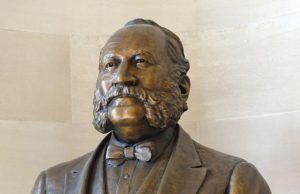
Bust of Adolph Sutro
West of the city, one of Sutro’s prized properties overlooked the Pacific Ocean at a place called “Land’s End.” It was sandy, to be sure, but featured spectacular views of Seal Rocks and Ocean Beach and was the site of a fashionable resort called the Cliff House. Unfortunately, Land’s End was a long way from downtown, so only the rich could afford the stagecoach ride from the city center.
Sutro aimed to change all that. In 1881, he made plans to refurbish the Cliff House and turn it into a family-friendly attraction that customers could visit via his own “Sutro Railroad” which would run between Land’s End and downtown. Despite a devastating fire and other obstacles, he eventually opened the “new” Cliff House in 1896. To many visitors, the renovated restaurant and meeting center looked like a giant gingerbread castle ready to drop into the ocean. Despite (or perhaps because of) its fairytale appearance, it quickly became the “go to” venue for visitors of all income levels who enjoyed dining and dancing by the sea.

Image of Cliff House
But the Cliff House was only part of Sutro’s plan to attract city dwellers. His more ambitious goal was to build the world’s largest public indoor salt-water swimming and entertainment complex. In 1888 he offered a large cash prize to the firm who could build what he had in mind, and the same architects who’d designed the revamped Cliff House won the commission.
The natatorium took several years and incredible ingenuity to build. One problem, for example, was the proximity to the ocean. It required four attempts before the engineers could design and build a sea wall strong enough to withstand the force of the waves.
When it finally opened in 1896, the Sutro Baths was a magnificent glass-domed complex featuring seven pools (one of which was spring-fed), each heated to a different temperature. Unlike its freshwater counterparts, the saltwater baths used the power of the tides to continuously filter the water. During high tides nearly two million gallons of water would be recycled in about an hour; during low tides, a powerful seal level pump could refill the tanks in about five hours.
It was a swimmer’s paradise, but there was one drawback we might not appreciate today: those wanting to take a dip had to rent bathing suits, which were apparently gray (from over-washing) and floppy—decidedly not the latest fashion. Still, it was no doubt a small price to pay for the ability to join in the fun. Bathers could enter the pools in a variety of ways, including trampolines, flying rings, slides, swings, toboggan slides and diving platforms. Those who weren’t swimming could watch the action from a raised observation deck. That level also had carnival rides and other amusements. Over the years all manner of attractions were staged, from beauty pageants, talent shows, and swimming championships to trapeze acts, magicians, and dwarf boxing matches.

Sutro Baths Photo
As if all that weren’t enough, Sutro offered a natural history museum, art exhibits, an amphitheater for concerts, an ice-skating rink, and restaurants. Had you lived in San Francisco at the turn of the twentieth century, you might have taken the train and spent many a Sunday afternoon frolicking in the water at the Sutro Baths—along with up to ten thousand of your closest friends!
All good people—and good things—must come to an end. Only two years after opening the popular entertainment center, Adolph Sutro died, and his vast holdings fell prey to squabbling heirs.
The Cliff House, which miraculously survived the 1906 Earthquake, was gutted by a mysterious fire in 1907 but rebuilt (in a more sedate style) and stayed in business as a popular restaurant and concession of the National Park Service until Covid 19 policies forced its closure at the end of 2020.
As for the iconic Sutro Baths, it continued to operate for many years, but sadly never made a profit, and eventually was sold to the owner of Playland at the Beach, an amusement park, in 1952. It was closed down for good in 1966 and soon thereafter the giant structure burned to the ground. If you travel to Land’s End today, you can still see the outline of where the Baths stood. [Sutro bath ruins today]

Sutro Baths Ruins Today
What a wonder it must have been.
###
[source: National Park Service, Wikipedia, Historic San Francisco]

Instagram: @coffeepotbookclub
August 17, 2021
Tracey Warr The Anarchy Coffee Pot Book Club Blog Tour #HistoricalFiction #Medieval #BlogTour #CoffeePotBookClub @TraceyWarr1 @maryanneyarde
It is my pleasure to feature Tacey Warr as part of The Coffee Pot Book Club Blog Tour being held from June 22nd – August 24th, 2021. Tracey Warr is the author of the historical fiction/historical romance novel, The Anarchy (Conquest, Book 3), which was released by Impress Books on 2nd June 2020 (218 pages).
Below are highlights of The Anarchy, Tracey Warrr’s author bio, and a guest post.
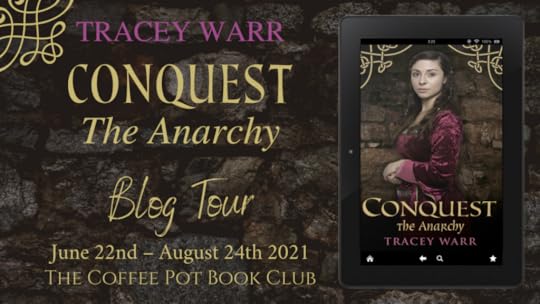
HIGHLIGHTS: THE ANARCHY
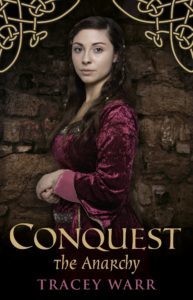
The Anarchy
(Conquest, Book 3)
By Tracey Warr
(blurb)
Unhappily married to Stephen de Marais, the Welsh princess, Nest, becomes increasingly embroiled in her countrymen’s resistance to the Norman occupation of her family lands. She plans to visit King Henry in the hope of securing a life away from her unwanted husband, but grieving for the loss of his son, the King is obsessed with relics and prophecies.
Meanwhile, Haith tries to avoid the reality that Nest is married to another man by distracting himself with the mystery of the shipwreck in which the King’s heir drowned. As Haith pieces together fragments of the tragedy, he discovers a chest full of secrets, but will the revelations bring a culprit to light and aid the grieving King?
Will the two lovers be united as Nest fights for independence and Haith struggles to protect King Henry?
Buy Links:
Universal Links:
The Daughter of the Last King (Book 1)
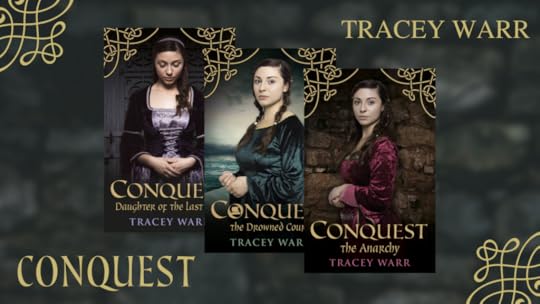
Retail Links to The Anarchy:
Amazon UK  Amazon US
Amazon US  Amazon CA
Amazon CA  Amazon AU
Amazon AU  Barnes and Noble
Barnes and Noble  Waterstones
Waterstones  Kobo
Kobo

Tracey Warr (1958- ) was born in London and lives in the UK and France. Her first historical novel, Almodis the Peaceweaver (Impress, 2011) is set in 11th century France and Spain and is a fictionalised account of the true story of the Occitan female lord, Almodis de la Marche, who was Countess of Toulouse and Barcelona. It was shortlisted for the Impress Prize for New Fiction and the Rome Film Festival Books Initiative and won a Santander Research Award. Her second novel, The Viking Hostage, set in 10th century France and Wales, was published by Impress Books in 2014 and topped the Amazon Australia charts. Her Conquest trilogy, Daughter of the Last King, The Drowned Court, and The Anarchy recount the story of a Welsh noblewoman caught up in the struggle between the Welsh and the Normans in the 12th century. She was awarded a Literature Wales Writers Bursary. Her writing is a weave of researched history and imagined stories in the gaps in history.
Tracey Warr studied English at University of Hull and Oxford University, gaining a BA (Hons) and MPhil. She worked at the Arts Council, Institute of Contemporary Arts, Chatto & Windus Publishers, and edited Poetry Review magazine with Mick Imlah. She also publishes art writing on contemporary artists, and in 2016 she published a future fiction novella, Meanda, in English and French, as part of the art project, Exoplanet Lot. She recently published a series of three books, The Water Age, which are future fiction and art and writing workshop books – one for adults and one for children – on the topic of water in the future. She gained a PhD in Art History in 2007 and was Guest Professor at Bauhaus University and Senior Lecturer at Oxford Brookes University and Dartington College of Arts. Her published books on contemporary art include The Artist’s Body (Phaidon, 2000), Remote Performances in Nature and Architecture (Routledge, 2015) and The Midden (Garret, 2018). She gained an MA in Creative Writing at University of Wales Trinity St David in 2011. She is Head of Research at Dartington Trust and teaches on MA Poetics of Imagination for Dartington Arts School.
Social Media Links:
Website  Twitter
Twitter  Facebook
Facebook  LinkedIn
LinkedIn  Instagram
Instagram  Amazon Author Page
Amazon Author Page  Goodreads
Goodreads
The Anarchy is set between 1121 and 1139 and recounts the turbulent life of the Welsh noblewoman Nest ferch Rhys. Nest was the daughter of the last independent king in Wales, Rhys ap Tewdwr. Her father and three of her brothers were killed by invading Normans and she was probably raised in the Norman court. She became the mistress of the Norman king, Henry I, and had a son with him. She was married to Gerald FitzWalter, the Norman steward of Pembroke Castle, which had been part of her father’s kingdom. The Welsh prince, Owain of Powys, abducted her from Gerald for a few years. After Gerald died, she was married to Stephen de Marais, the Norman constable of Cardigan Castle. Some sources also claim that she had a relationship and a son with the Flemish sheriff of Pembroke Castle, Hait. The action of the novel moves between Wales and Normandy and places in England visited by King Henry’s I’s peripatetic court including Westminster, Bristol and Dunstable.
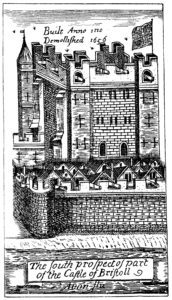
1 Bristol Castle
In The Anarchy, Nest travels from southwest Wales to meet King Henry I, her former lover, at Bristol Castle in September 1122, where she hopes to gain the king’s permission to separate from her unwelcome husband, Stephen de Marais. A Welsh heiress, though, might be used against the king by his enemies and Henry is initially reluctant to grant Nest’s request.
Nest and her female companions have to navigate rain-sodden land and treacherous river crossings to reach Bristol and when they arrive they find ‘a castle rising on a vast mound, strengthened by wall and battlements, towers and divers engines … with two rivers washing its sides’. The castle belonged to Robert, Earl of Gloucester, the king’s oldest illegitimate son, who was married to Mabel FitzHamon, Nest’s childhood friend. It stood at the confluence of the River Frome and the River Avon and was highly defensible.
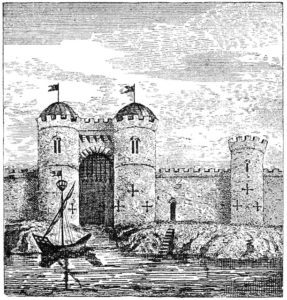
2 Water Gate to Bristol Castle
The first version of the castle was built between 1066 and 1088 by Robert FitzHamon, a close associate of William the Conqueror and his son King William II. FitzHamon was entrusted with furthering the Norman invasion in southwest England into Wales. He also occupied the Norman castle at Cardiff. The first fortification was updated by Robert of Gloucester who inherited the castle through his wife, Mabel FitzHamon, and built a great stone keep.

3 Plan of Bristol Castle
As an impregnable stronghold, Bristol Castle housed a number of very important prisoners, including King Henry’s older brother Robert, Duke of Normandy and later, during the civil war known as The Anarchy, King Stephen was held there in shackles after his capture at the Battle of Lincoln.
Robert of Gloucester’s seat at Bristol Castle became the centre of the civil war between Robert’s half-sister, the Empress Maud, and King Stephen. Maud held her court there on several occasions. In 1143, whilst the civil war still raged across England, Bristol Castle was considered safe enough as a location for Maud’s nine-year-old son Henry FitzEmpress to stay and receive part of his education. Henry eventually succeeded King Stephen and became King Henry II. Only a few parts of the castle keep and curtain wall remain in contemporary Bristol and are preserved in Castle Park.
Image credits
1 Bristol Castle
From JF Nicholls and John Taylor, Bristol Past and Present (Bristol: Arrowsmith, 1882). Text available at the Internet Archive, Public Domain, doi:10.1093/library/s1-V.1.86. Images by unknown engravers, and thus are PD due to age, per the relevant British legislation https://commons.wikimedia.org/w/index.php?curid=8657002
2 Water Gate to Bristol Castle
From JF Nicholls and John Taylor, Bristol Past and Present (Bristol: Arrowsmith, 1882). Text available at the Internet Archive, Public Domain, doi:10.1093/library/s1-V.1.86. Images by unknown engravers, and thus are PD due to age, per the relevant British legislation
https://commons.wikimedia.org/wiki/File:Water_Gate_to_Bristol_Castle.jpg
3 Plan of Bristol Castle
From JF Nicholls and John Taylor, Bristol Past and Present (Bristol: Arrowsmith, 1882). Text available at the Internet Archive, Public Domain, doi:10.1093/library/s1-V.1.86. Images by unknown engravers, and thus are PD due to age, per the relevant British legislation
https://commons.wikimedia.org/w/index.php?curid=8657066

@coffepotbookclub
August 8, 2021
#RRBC’S 6th Annual #Writers’ #Conference & #Book #Expo #WCBE21! @RRBC_Org
I’m pleased to announce a virtual event sponsored by the Rave Reviews Book Club (RRBC) on Monday, August 9th, which is open for the general public to drop by and participate. Click on RRBC’s 6th Annual Writers’ Conference & Book Expo.
Be sure to visit the Author Booth for each featured RRBC author with a chance to win a door prize. I’m honored to be included in this awesome group. And there is much more!
There will be games, prizes, surprises, and other goodies, so be sure to visit each Author Booth, take a look around, then leave a comment for your chance to win each Author Booth’s door prize!
Of course, we’ll have our READING ROOM open and one of our members is going to blow you away showcasing their talent!
If you’re into BINGO, purchase your BINGO cards and join us for a game or two!
And what we all wait for every year – our RAFFLE! Yes, each year we raffle off (7) $100 Amazon gift cards and this is open to the public so go on and snag your tickets today! Raffle tickets are only $5! How awesome would that prize be? Some of them also include additional goodies like other gift certificates, ebooks, and more! Enter for your chance to win one or more of these $100 Amazon gift card gift baskets. The more tickets you buy, the greater your chances of winning. (Please do not purchase more than 7 tickets).
This year for the first time ever, we’ve added our BEST BOOK COVER CONTEST! This contest is open to the general public so go ahead and enter your book cover(s) now! Share your comments with us and let us know which one you think is best!
Click for a full ITINERARY OF EVENTS!
The venue opens at 5 PM CT on Monday, 8/9/21. We hope to see you there! In the event of minor time delays, please check the sidebar of the RRBC website for updates.
July 20, 2021
BARBARA GREIG DISCOVERY COFFEE POT BOOK CLUB BLOG TOUR #HistoricalFiction #BlogTour #CoffeePotBookClub @BarbaraGreig @matadorbooks @maryanneyarde
It is my pleasure to feature Barbara Greig as part of The Coffee Pot Book Club Blog Tour being held from June 2nd – August 4th, 2021. Barbara Greig is the author of the historical fiction novel, Discovery, which was released by Matador (imprint of Troubador Publishing Ltd) on 28th June 2020 (336 pages).
Below are highlights of Discovery, Barbara Greig’s author bio, and an excerpt from her book.

HIGHLIGHTS: DISCOVERY
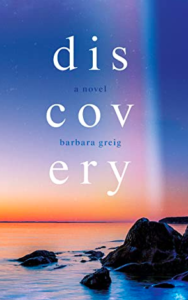
Discovery
by Barbara Greig
Discovery: An epic tale of love, loss and courage When Elizabeth Gharsia’s headstrong nephew, Gabriel, joins Samuel Champlain’s 1608 expedition to establish a settlement at Quebec, he soon becomes embroiled in a complicated tribal conflict. As months turn into years, Gabriel appears lost to his family.
Meanwhile at home in France the death of her father, Luis, adds to Elizabeth’s anguish. Devastated by her loss, she struggles to make sense of his final words. Could her mother’s journals, found hidden among Luis’s possessions, provide the key to the mystery?
The arrival of Pedro Torres disrupts Elizabeth’s world even further. Rescued from starvation on the streets of Marseille by her brother, Pedro is a victim of the brutal expulsion of his people from Spain. Initially antagonistic, will Elizabeth come to appreciate Pedro’s qualities and to understand the complexity of her family?
Buy Links:
Available on Kindle Unlimited.
Amazon UK  Amazon US
Amazon US  Amazon CA
Amazon CA  Amazon AU
Amazon AU  Waterstones
Waterstones  Kobo
Kobo  Troubador
Troubador  WHSmith
WHSmith  iBooks
iBooks  Google Play
Google Play  Book Depository
Book Depository
AUTHOR BIO: BARBARA GREIG
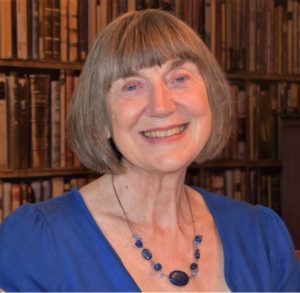
Barbara Greig was born in Sunderland and lived in Roker until her family moved to Teesdale. An avid reader, she also discovered the joy of history at an early age. A last-minute change of heart, in the sixth form, caused her to alter her university application form. Instead of English, Barbara read Modern and Ancient History at Sheffield University. It was a decision she never regretted.
Barbara worked for twenty years in sixth form colleges, teaching History and Classical Civilisation. Eventually, although enjoying a role in management, she found there was less time for teaching and historical study. A change of focus was required. With her children having flown the nest, she was able to pursue her love of writing and story-telling. She has a passion for hiking, and dancing, the perfect antidotes to long hours of historical research and writing, as well as for travel and, wherever possible, she walks in the footsteps of her characters.
Discovery is Barbara’s second novel. Her debut novel Secret Lives was published in 2016 (Sacristy Press).
Social Media Links:
Twitter  Facebook
Facebook  Amazon Author Page
Amazon Author Page  Goodreads
Goodreads
Ch30 Excerpt from DISCOVERY (Greig)
The day after their return to Caors dawned brightly, with just enough chill in the air to persuade Catarina to light the fire in the parlour. She was coaxing the first flames to catch when her efforts were interrupted by an urgent knocking. She hurried across the hall, the loud noise echoing around her, and pulled open the heavy oak door to reveal a diminutive figure.
“It is early to be thundering on a person’s door.”
Shrewd dark eyes pinned her to the spot. “I am Sara Gaulbert and I wish to speak to your mistress.”
“She is abed.”
“Then wake her up!”
Her attention caught, Catarina looked past the old woman to the untethered mule, who had chosen that moment to defecate copiously in Elizabeth’s yard. She watched the animal move a couple of paces to reach some grass, pulling the old, battered cart behind him, and then she gave Sara the benefit of her most withering expression.
“Wake up your mistress immediately,” demanded the tiny figure. “And invite me in.” Sara Gaulbert would stand no insolence from an uppity servant.
Five minutes later Elizabeth appeared, a shawl quickly thrown over her night clothes. In her haste, she had forgotten her slippers and she hopped from one foot to the other as the cold penetrated from the stone flags. “What is it, Sara?”
“It is the harvest. The pickers are late.” The enormity of the situation was clear on the old woman’s face. Her eyes implored. “We could lose much of the crop.”
“I will come.” Nobody had noticed Pedro’s presence. Three pairs of eyes turned towards him. For a moment he experienced the customary irritation, that he often seemed to be invisible to people, and then suppressed it as unworthy in the circumstances. How could they have known that he had risen well before dawn to ensure the ledgers were up to date before he left for Amsterdam?
“I will come,” Catarina volunteered, rather too swiftly for her mistress’s liking. Elizabeth raised her eyebrows in a gesture reminiscent of her father and Sara waited with interest to see how her friend would respond to the maid’s impudent reaction. “I will be of more value than you. You are not used to hard labour.”
Conscious that Pedro was studying her, Elizabeth clamped her lips shut on her sharp response and rephrased her answer. “It is true, that of late, I have not had the responsibility of running the household alone, but I can assure you I am capable of bringing in the harvest. When I was younger my father insisted all of us worked in the vines and I enjoyed it.” She paused, felt the emotion building, and determined to continue. “It was I who taught Gabriel to cut his first bunches.”
Sara looked from one woman to the other: something was afoot which was more complicated than aptitude for hard work. She stole a glance at Pedro Torres. He was staring at Elizabeth with a mixture of sympathy and amusement, while Catarina’s focus was clearly on him. Now I understand, she thought, and studied the maid. The woman was comely enough and, on Sara’s first acquaintance, she appeared spirited, which was a characteristic Sara secretly admired, but she doubted Pedro would be interested. In her opinion Pedro’s admiration of Elizabeth was perceptible and Sara truly believed they would make a good match.
He caught the old woman’s eye and smiled the curious half-smile she had often seen, as if his life had never allowed him to beam broadly. “You must be exhausted,” he said, “rising so early to come and see us.”
Sara chuckled, pleased her journey had not been wasted. “The mule needs the rest, which he can have while I break my fast with you. Then we can all leave together.”
*
By noon they were out in the fields, except for Sara, who had retired to rest. Pedro was working on a row with Elizabeth, much to Catarina’s chagrin, and he found he was revelling in the repetitive task. After filling each basket, he stretched and allowed himself a few moments to appreciate the scenery. Laden with fruit, row upon row of vines, their autumnal leaves quivering in the light breeze, unfolded up the slopes before him. He could see Luc and Helena, Jacques and Catarina, and the collection of neighbours who had rallied around to help, all methodically progressing between the rows. He had noticed that Jacques periodically glanced in the direction of the farmhouse, willing the itinerant pickers to arrive. It was true that the Gaulberts had started to harvest early but the extra hands they needed usually arrived in good time.
“Stop idling,” teased Elizabeth as she, too, stretched and placed her hands on the small of her back.
Pedro retaliated in the same tone. “Who are you to call me idle, Mistress Gharsia? My basket is full, unlike yours.” He hoisted the hod onto his back, struggling slightly with the straps, and called back as he strode towards the waiting cart. “However, if you speak kindly to me I will carry your grapes, too.” He turned when he reached the end of the row, pleased to see that she was still watching him.
“Pedro!” Jacques voice startled him, as the vintner was partially hidden by the increasing pile of grapes. “How about you coming to the barn to start the pressing?”
“I was helping Elizabeth.”
“She will be fine. She has been harvesting grapes since she was a child.”
“I will just go and tell her.”
Jacques waited impatiently. How long did it take for a man to say he was going to the press? he asked himself, reflecting on the way Elizabeth leant forward slightly, apparently listening intently. Her affection for the Castilian was as obvious to Jacques as it was to his mother, but it was no business of his.
The cellar was cool and dark after the outside heat and it took a moment for Pedro to adjust his eyes. The huge vats and press gradually came into focus as Jacques said, “We have enough grapes for one vat and you and I will have to manage. Come on, strip off.” Too busy pulling off his own shirt, the vintner did not notice Pedro stiffen and pause, torn between exposing his lacerated back and his desire to stomp the black, glistening grapes. “Come on,” repeated Jacques as he clambered into the vat and, if he noticed the scars, he showed no sign of it. “We have no time to lose. All the grapes picked today need to be crushed.”
The stalks were hard, digging into Pedro’s feet, while the fruit burst and oozed through his toes. At first, the strange sensation was disconcerting but soon he was lost in the rhythm, and although he did not know the words, he hummed to the tune of his companion’s song. He became absorbed in the physical exertion, his mind free, for once, of facts and figures, supressed emotion, and haunting memories. At the end of each verse Pedro breathed deeply, filling his lungs with the musty smell of the old stones and the earth floor, wine-soaked over decades, which mingled with the pungency of the newly crushed grapes and the sharp, woody smell of the new oak barrels Jacques had recently acquired. He experienced a moment of complete contentment and then a voice broke the spell. Both men turned towards the door.
“Not now, Mama. Pedro is here!”
Sara stayed where she was, averting her eyes. “Pierre has just been to tell us the pickers have been seen. They landed at Fumel this morning so will be here by sunset.”
Her son punched the air in delight and grinned at his companion. “You can go home tomorrow.” Pedro’s disappointment must have shown on his face as Jacques swiftly added, “Only if you wish to.”

Instagram: @coffeepotbookclub
BARBARA GREIG DISCOVERY COFFEE POT BOK CLUB BLOG TOUR #HistoricalFiction #BlogTour #CoffeePotBookClub @BarbaraGreig @matadorbooks @maryanneyarde
It is my pleasure to feature Barbara Greig as part of The Coffee Pot Book Club Blog Tour being held from June 2nd – August 4th, 2021. Barbara Greig is the author of the historical fiction novel, Discovery, which was released by Matador (imprint of Troubador Publishing Ltd) on 28th June 2020 (336 pages).
Below are highlights of Discovery, Barbara Greig’s author bio, and an excerpt from her book.

HIGHLIGHTS: DISCOVERY

Discovery
by Barbara Greig
Discovery: An epic tale of love, loss and courage When Elizabeth Gharsia’s headstrong nephew, Gabriel, joins Samuel Champlain’s 1608 expedition to establish a settlement at Quebec, he soon becomes embroiled in a complicated tribal conflict. As months turn into years, Gabriel appears lost to his family.
Meanwhile at home in France the death of her father, Luis, adds to Elizabeth’s anguish. Devastated by her loss, she struggles to make sense of his final words. Could her mother’s journals, found hidden among Luis’s possessions, provide the key to the mystery?
The arrival of Pedro Torres disrupts Elizabeth’s world even further. Rescued from starvation on the streets of Marseille by her brother, Pedro is a victim of the brutal expulsion of his people from Spain. Initially antagonistic, will Elizabeth come to appreciate Pedro’s qualities and to understand the complexity of her family?
Buy Links:
Available on Kindle Unlimited.
Amazon UK  Amazon US
Amazon US  Amazon CA
Amazon CA  Amazon AU
Amazon AU  Waterstones
Waterstones  Kobo
Kobo  Troubador
Troubador  WHSmith
WHSmith  iBooks
iBooks  Google Play
Google Play  Book Depository
Book Depository
AUTHOR BIO: BARBARA GREIG

Barbara Greig was born in Sunderland and lived in Roker until her family moved to Teesdale. An avid reader, she also discovered the joy of history at an early age. A last-minute change of heart, in the sixth form, caused her to alter her university application form. Instead of English, Barbara read Modern and Ancient History at Sheffield University. It was a decision she never regretted.
Barbara worked for twenty years in sixth form colleges, teaching History and Classical Civilisation. Eventually, although enjoying a role in management, she found there was less time for teaching and historical study. A change of focus was required. With her children having flown the nest, she was able to pursue her love of writing and story-telling. She has a passion for hiking, and dancing, the perfect antidotes to long hours of historical research and writing, as well as for travel and, wherever possible, she walks in the footsteps of her characters.
Discovery is Barbara’s second novel. Her debut novel Secret Lives was published in 2016 (Sacristy Press).
Social Media Links:
Twitter  Facebook
Facebook  Amazon Author Page
Amazon Author Page  Goodreads
Goodreads
Ch30 Excerpt from DISCOVERY (Greig)
The day after their return to Caors dawned brightly, with just enough chill in the air to persuade Catarina to light the fire in the parlour. She was coaxing the first flames to catch when her efforts were interrupted by an urgent knocking. She hurried across the hall, the loud noise echoing around her, and pulled open the heavy oak door to reveal a diminutive figure.
“It is early to be thundering on a person’s door.”
Shrewd dark eyes pinned her to the spot. “I am Sara Gaulbert and I wish to speak to your mistress.”
“She is abed.”
“Then wake her up!”
Her attention caught, Catarina looked past the old woman to the untethered mule, who had chosen that moment to defecate copiously in Elizabeth’s yard. She watched the animal move a couple of paces to reach some grass, pulling the old, battered cart behind him, and then she gave Sara the benefit of her most withering expression.
“Wake up your mistress immediately,” demanded the tiny figure. “And invite me in.” Sara Gaulbert would stand no insolence from an uppity servant.
Five minutes later Elizabeth appeared, a shawl quickly thrown over her night clothes. In her haste, she had forgotten her slippers and she hopped from one foot to the other as the cold penetrated from the stone flags. “What is it, Sara?”
“It is the harvest. The pickers are late.” The enormity of the situation was clear on the old woman’s face. Her eyes implored. “We could lose much of the crop.”
“I will come.” Nobody had noticed Pedro’s presence. Three pairs of eyes turned towards him. For a moment he experienced the customary irritation, that he often seemed to be invisible to people, and then suppressed it as unworthy in the circumstances. How could they have known that he had risen well before dawn to ensure the ledgers were up to date before he left for Amsterdam?
“I will come,” Catarina volunteered, rather too swiftly for her mistress’s liking. Elizabeth raised her eyebrows in a gesture reminiscent of her father and Sara waited with interest to see how her friend would respond to the maid’s impudent reaction. “I will be of more value than you. You are not used to hard labour.”
Conscious that Pedro was studying her, Elizabeth clamped her lips shut on her sharp response and rephrased her answer. “It is true, that of late, I have not had the responsibility of running the household alone, but I can assure you I am capable of bringing in the harvest. When I was younger my father insisted all of us worked in the vines and I enjoyed it.” She paused, felt the emotion building, and determined to continue. “It was I who taught Gabriel to cut his first bunches.”
Sara looked from one woman to the other: something was afoot which was more complicated than aptitude for hard work. She stole a glance at Pedro Torres. He was staring at Elizabeth with a mixture of sympathy and amusement, while Catarina’s focus was clearly on him. Now I understand, she thought, and studied the maid. The woman was comely enough and, on Sara’s first acquaintance, she appeared spirited, which was a characteristic Sara secretly admired, but she doubted Pedro would be interested. In her opinion Pedro’s admiration of Elizabeth was perceptible and Sara truly believed they would make a good match.
He caught the old woman’s eye and smiled the curious half-smile she had often seen, as if his life had never allowed him to beam broadly. “You must be exhausted,” he said, “rising so early to come and see us.”
Sara chuckled, pleased her journey had not been wasted. “The mule needs the rest, which he can have while I break my fast with you. Then we can all leave together.”
*
By noon they were out in the fields, except for Sara, who had retired to rest. Pedro was working on a row with Elizabeth, much to Catarina’s chagrin, and he found he was revelling in the repetitive task. After filling each basket, he stretched and allowed himself a few moments to appreciate the scenery. Laden with fruit, row upon row of vines, their autumnal leaves quivering in the light breeze, unfolded up the slopes before him. He could see Luc and Helena, Jacques and Catarina, and the collection of neighbours who had rallied around to help, all methodically progressing between the rows. He had noticed that Jacques periodically glanced in the direction of the farmhouse, willing the itinerant pickers to arrive. It was true that the Gaulberts had started to harvest early but the extra hands they needed usually arrived in good time.
“Stop idling,” teased Elizabeth as she, too, stretched and placed her hands on the small of her back.
Pedro retaliated in the same tone. “Who are you to call me idle, Mistress Gharsia? My basket is full, unlike yours.” He hoisted the hod onto his back, struggling slightly with the straps, and called back as he strode towards the waiting cart. “However, if you speak kindly to me I will carry your grapes, too.” He turned when he reached the end of the row, pleased to see that she was still watching him.
“Pedro!” Jacques voice startled him, as the vintner was partially hidden by the increasing pile of grapes. “How about you coming to the barn to start the pressing?”
“I was helping Elizabeth.”
“She will be fine. She has been harvesting grapes since she was a child.”
“I will just go and tell her.”
Jacques waited impatiently. How long did it take for a man to say he was going to the press? he asked himself, reflecting on the way Elizabeth leant forward slightly, apparently listening intently. Her affection for the Castilian was as obvious to Jacques as it was to his mother, but it was no business of his.
The cellar was cool and dark after the outside heat and it took a moment for Pedro to adjust his eyes. The huge vats and press gradually came into focus as Jacques said, “We have enough grapes for one vat and you and I will have to manage. Come on, strip off.” Too busy pulling off his own shirt, the vintner did not notice Pedro stiffen and pause, torn between exposing his lacerated back and his desire to stomp the black, glistening grapes. “Come on,” repeated Jacques as he clambered into the vat and, if he noticed the scars, he showed no sign of it. “We have no time to lose. All the grapes picked today need to be crushed.”
The stalks were hard, digging into Pedro’s feet, while the fruit burst and oozed through his toes. At first, the strange sensation was disconcerting but soon he was lost in the rhythm, and although he did not know the words, he hummed to the tune of his companion’s song. He became absorbed in the physical exertion, his mind free, for once, of facts and figures, supressed emotion, and haunting memories. At the end of each verse Pedro breathed deeply, filling his lungs with the musty smell of the old stones and the earth floor, wine-soaked over decades, which mingled with the pungency of the newly crushed grapes and the sharp, woody smell of the new oak barrels Jacques had recently acquired. He experienced a moment of complete contentment and then a voice broke the spell. Both men turned towards the door.
“Not now, Mama. Pedro is here!”
Sara stayed where she was, averting her eyes. “Pierre has just been to tell us the pickers have been seen. They landed at Fumel this morning so will be here by sunset.”
Her son punched the air in delight and grinned at his companion. “You can go home tomorrow.” Pedro’s disappointment must have shown on his face as Jacques swiftly added, “Only if you wish to.”

Instagram: @coffeepotbookclub
July 6, 2021
Zenobia Neil Ariadne Unraveled Coffee Pot Book Club Blog Tour #HistoricalRomance #HistoricalFantasy #AncientGreece #BlogTour #CoffeePotBookClub @ZenobiaNeil @maryanneyarde
I’m delighted to feature Zenobia Neil as part of The Coffee Pot Book Club Blog Tour being held from July 5th – July 16th, 2021. Zenobia Neil is the author of the Greek Retelling/ Historical Romance novel, Ariadne Unraveled: A Mythic Retelling, which was released by Hypatia Books today, 7th July 2021 (345 pages).
Below are highlights of Ariadne Unraveled: A Mythic Retelling, Zenobia Neil’s author bio, and my 5 of 5 star review of her book.

To follow the tour, click Tour Page Link
HIGHLIGHTS: ARIADNE UNRAVELED
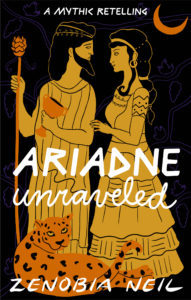 Ariadne Unraveled: A Mythic Retelling
Ariadne Unraveled: A Mythic Retelling
by Zenobia Neil
Ariadne, high priestess of Crete, grew up duty-bound to the goddess Artemis. If she takes a husband, she must sacrifice him to her goddess after no more than three years of marriage. For this reason, she refuses to love any man, until a mysterious stranger arrives on her island.
The stranger is Dionysus, the new god of wine who empowers women and breaks the rules of the old gods. He came to Crete seeking vengeance against Artemis. He never expected to fall in love.
Furious that Dionysus would dare meddle with her high priestess, Artemis threatens to kill Ariadne if Dionysus doesn’t abandon her. Heartbroken, the new god leaves Crete, vowing to become better than the Olympians.
From the bloody labyrinth and the shadows of Hades to the halls of Olympus, Dionysus must find a way to defy Artemis and unite with his true love. Forced to betray her people, Ariadne discovers her own power to choose between the goddess she pledged herself to and the god she loves.
Buy Links:
Universal Amazon Link  Amazon UK
Amazon UK  Amazon US
Amazon US  Amazon CA
Amazon CA  Amazon AU
Amazon AU

Zenobia Neil was named after an ancient warrior queen who fought against the Romans. She writes historical romance about the mythic past and Greek and Roman gods having too much fun. Visit her at ZenobiaNeil.com
Social Media Links:
Website  Twitter
Twitter  Facebook
Facebook  Instagram
Instagram  Pinterest
Pinterest  BookBub
BookBub  Amazon Author Page
Amazon Author Page  Goodreads
Goodreads
5 of 5 stars
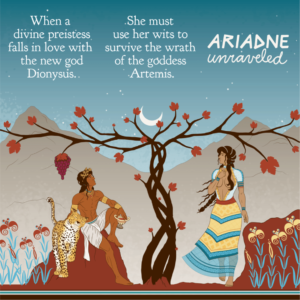
Author Zenobia Neil retells the epic tale about a High Priestess of Artemis in Ariadne Unraveled: A Mythic Retelling by weaving various Greek myths and lore together into a compelling story. The daughter of the vengeful king, Minos, and the sorceress mother, Pasiphae, Ariadne grows up in a maze-like palace in Crete. Every year, Midas sacrifices young Greek men and women to her brother, the Minotaur, in retribution for the death of another brother. The story begins with the prologue in which Theseus has abandoned the pregnant Ariadne to die. Then in Part One, we find out what previously happened to her.
Ariadne devotes all her loyalty and love to the goddess Artemis. If she marries a man, she must slit the man’s throat to sacrifice to Artemis. She meets the new god, Dionysus, bearing the gift of an intoxicating new drink, wine, in a meadow. His only goal is to serve Ariadne and fulfill her desires. However, Ariadne’s life unravels after she tastes erotic pleasure with the new god of vine. Unbeknowst to Ariadne, her liaison with Dionysus incites Artemis’ jealousy and vengeful anger because she has allowed herself to be seduced by a godling of no consequence. The ramifications of Artemis’ revenge propel Ariadne and Dionysus into an epic adventure across the Mediterranean region and into the Underworld as they both struggle to understand their new roles in a changing world.
Author Neil has masterfully re-imagined the Greek myths about Ariadne. For readers who enjoyed Madeline Miller’s recent novel, Circe, they should also enjoy reading Ariadne Unraveled: A Mythic Retelling. The author captures the female-centered religion and culture of the Minoans in Ancient Crete, where women openly display their breasts with pride of their womanly attributes. The Greek paternalistic society is slowly displacing the Minoan civilization with its pantheon of lusty and vengeful gods. The primary characters, Ariadne and Dionysus, are engaging and spice-up scenes with their sensual lovemaking. The tale is also an epic adventure in which both Ariadne and Dionysus struggle to find their roles in a changing world. It is a multi-layered, mythic story that explores deeper themes of unconditional love, vengeance, coming-of-age, redemption, and spiritual resurrection.
I highly recommend Ariadne Unraveled: A Mythic Retelling for readers who enjoy reading Greek myths and learning more about ancient civilizations.

@coffeepotbookclub
July 2, 2021
Two Faces of Janus Just Released #HistoricalFiction #AncientRome #MarkAntony #RRBC
I’m thrilled to announce that Two Faces of Janus: A Short Story of Ancient Rome was released on June 29, 2021. I wrote this short story as a challenge to enter the 2021 RRBC 90-Day Alpha/Omega (Beginning to End) Short Story Writing Contest, in which I had to draft, edit, format, proof, and publish a short story within 90 days.
Inspiration for Two Faces of JanusAs I began writing the historical fantasy series, Curse of Clansmen and Kings, one of the questions I asked myself in the development of characters is how Lucius Antonius reacted to the charges of treason against his father, Iullus Antonius, and the downfall of his grandfather, Marcus Antonius (Mark Antony). In the series, Lucius controls his son, Marcellus, with an iron fist in his determination to restore the family’s legacy out of the ashes of his maligned forefathers. Two Faces of Janus explores how Lucius as a young man must face the imperial crossfire when his father is accused of treason for having an affair with Julia, daughter of Roman Emperor Augustus Caesar.
Historical BackdropThe imperial dynasty of Augustus Caesar reached a crisis point in 2 BC as various factions in the family maneuvered to shape the politics after he died. Augustus had only one biological child, Julia, with his second wife, Scribonia. He divorced her to marry Livia, who brought two stepsons (Claudian dynasty) into their marriage but never bore a child with him. Augustus used Julia as a political game piece to assure the Julian dynasty through strategic marriages. The Antonius dynasty was added to the mix through Mark Antony’s marriage with Augustus’s sister, Octavia.
One of the mysteries in Roman history is why Augustus Caesar overreacted when he learned Julia had adulterous affairs with powerful politicians. Her primary lover was Iullus Antonius. Augustus forced Iullus to commit suicide for his treasonous affair while he banished Julia and her other lovers. There was likely a political element of infighting between two factions—one centered on Julia and her sons (Gaius and Lucius) and the other on Livia and her son, Tiberius.
History is silent on how Iullus’s wife, Marcella Major, and their eighteen-year-old son, Lucius, reacted to his suicide and disgrace. Marcella Major, the oldest daughter of Octavia, was first married to Marcus Vipsanius Agrippa—Augustus’s close friend, general, and statesman responsible for constructing some of the most notable buildings in the history of Rome and for critical military victories. After Augustus almost died in 23 BC, he forced Agrippa to divorce Marcella Major to marry Julia. The political marriage between Agrippa and Julia strengthened the constitutional stability by providing for a political heir or replacement if Augustus succumbed to his chronic ill health. Marcella Major was then obligated to marry Iullus Antonius, and together they had one son, Lucius, and a daughter.
Very little is known about Lucius except that he went to Massalia (present-day Marseilles) on the pretext of studying law after his father’s disgrace. Likely, Augustus unofficially demanded that Lucius exile for his father’s crime.
Highlights of Two Faces of Janus
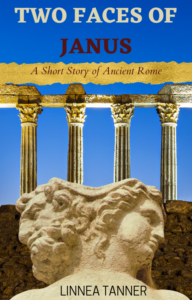
Two Faces of Janus
(A Short Story of Ancient Rome)
by Linnea Tanner
A young nobleman confronts a specter from the past that could threaten his family’s legacy.
A brash young aristocrat, Lucius Antonius anticipates Emperor Augustus Caesar will support his lofty ambitions to serve as a praetor in the Roman justice system in 2 BC Rome. As the son of the distinguished politician and poet, Iullus Antonius, Lucius prays to Janus, the two-faced god of beginnings, to open the door for him to rise politically. But he is unaware of the political firestorm ready to erupt in the imperial family.
Augustus must confront evidence that his daughter, Julia, has behaved scandalously in public and that Iullus is her lover. The prospect that Julia might want to marry Iullus—the only surviving son of Marcus Antonius—threatens to redirect the glory from Augustus to his most hated rival beyond the grave. Caught in the political crossfire, Lucius must demonstrate his loyalty to Augustus by meeting all of his demands or face the destruction of his family’s legacy and possibly his own life.
Will Lucius ultimately choose to betray and abandon his disgraced father?
Buy Links:
Two Faces of Janus is available on Kindle Unlimited. The paperback will be available soon at most retail outlets.
Upcoming EventsTo celebrate the release of Two Faces of Janus, a newsletter will be sent to subscribers at the beginning of next week for a chance to win a free book in the Hot Summer Giveaway! An update on the release of Skull’s Vengeance (Curse of Clansmen and Kings Book 4) and upcoming author events will be announced soon!
I greatly appreciate your continued support.
Best regards,
Linnea Tanner

June 30, 2021
Eric Schumacher Sigurd’s Swords Coffee Pot Book Club Blog Tour #HistoricalFiction #Vikings #KindleUnlimited #BlogTour #CoffeePotBookClub @DarkAgeScribe @maryanneyarde
It is my pleasure to feature Eric Schumacher as part of The Coffee Pot Book Club Blog Tour being held from June 28th – July 9th, 2021. Eric Schumacher is the author of the Viking historical fiction novel, Sigurd’s Swords (Olaf’s Saga Book 2), which was recently released by Bodn Books on 28 June 2021 (300 pages).
I was first introduced to Eric Schumacher as an author when I reviewed his book, War King (Hakon’s Saga Book 3), as a voluntary reviewer of the Historical Novel Society (See War King HHS Review). Since then, I have been a fan of Eric and previously interviewed him at Eric Schumacher Interview and reviewed his first book in Olaf’s Saga, Forged by Iron.
Below are highlights of Sigurd’s Swords, Eric Schumacher’s author bio, and my review of his book.

HIGHLIGHTS: SIGURD’S SWORDS
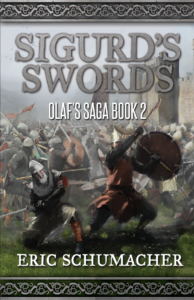
Sigurd’s Swords
(Olaf’s Saga, Book 2)
By Eric Schumacher
From best-selling historical fiction novelist, Eric Schumacher, comes the second volume in Olaf’s Saga: the adrenaline-charged story of Olaf Tryggvason and his adventures in the kingdom of the Rus.
AD 968. It has been ten summers since the noble sons of the North, Olaf and Torgil, were driven from their homeland by the treachery of the Norse king, Harald Eriksson. Having then escaped the horrors of slavery in Estland, they now fight among the Rus in the company of Olaf’s uncle, Sigurd.
It will be some of the bloodiest years in Rus history. The Grand Prince, Sviatoslav, is hungry for land, riches, and power, but his unending campaigns are leaving the corpses of thousands in their wakes. From the siege of Konugard to the battlefields of ancient Bulgaria, Olaf and Torgil struggle to stay alive in Sigurd’s Swords, the riveting sequel to Forged by Iron.
Follow the tour by clicking Tour Schedule
Buy Links:
The book is available on Kindle Unlimited.
Amazon US  Amazon UK
Amazon UK  Amazon AU
Amazon AU  Amazon CA
Amazon CA
 Eric Schumacher (1968 – ) is an American historical novelist who currently resides in Santa Barbara, California, with his wife and two children. He was born and raised in Los Angeles and attended college at the University of San Diego.
Eric Schumacher (1968 – ) is an American historical novelist who currently resides in Santa Barbara, California, with his wife and two children. He was born and raised in Los Angeles and attended college at the University of San Diego.
At a very early age, Schumacher discovered his love for writing and medieval European history, as well as authors like J.R.R. Tolkien and C.S. Lewis. Those discoveries continue to fuel his imagination and influence the stories he tells. His first novel, God’s Hammer, was published in 2005.
Social Media Links:
Website  Twitter
Twitter  Facebook
Facebook  LinkedIn
LinkedIn  BookBub
BookBub  Amazon Author Page
Amazon Author Page  Goodreads
Goodreads
5 of 5 stars
Sigurd’s Swords, the second book in Olaf’s Saga, sweeps you into a Nordic action/ adventure in the historical backdrop of the Rus Kingdom (modern-day Bulgaria) in AD 968. The Viking-age saga is based on the Norse tales of the legendary Viking king, Olaf Tryggvason, but is told in first-person by his companion and protector, Torgil. The saga follows the adventures and tribulations of three primary characters: Torgil, Prince Olaf, and Turid (Torgil’s love interest and female warrior). In the first book, Forged by Iron, the three adolescent companions barely escape with their lives after the betrayal by the Norse king, Harold Eriksson, and are subsequently enslaved under horrific conditions. After Lord Sigurd—Olaf’s uncle and commander to Rus Prince Sviatoslav—frees them, Olaf and Torgil feel indebted to him and serve as soldiers under his command.
The second book, Sigurd’s Swords, starts ten years later when Prince Sviatoslav is expanding the Rus Empire in bloody warfare. The story jumps into a brutal siege at Konugard, which Signurd’s army is defending against the treacherous Pechenegs. A small fleet of Rus ships has come to their aid, but someone has to slip through the enemy line to get a message to the Rus general aboard the vessel on where to attack. Without hesitation, Olaf and Torgil both volunteer as messengers and succeed in their mission. Ultimately hailed as heroes, they are but game pieces in the political machinations of royals and generals willing to sacrifice them to achieve their ambitions. The three companions wrestle with their internal turmoil as they strive to find their places in life. Their perseverance and loyalty to each other are tested in open battlefields, siege warfare, and royal courts. Universal themes of unconditional love, corruption of power, and betrayal resonated with me after reading the book.
Author Eric Schumacher has again skillfully portrayed the essence of the Norse characters in a riveting epic adventure with battles, political intrigue, and unrequited love. The brash and charismatic Olaf embraces his destiny to become a king while Torgil struggles to find his place as an honorable and courageous warrior. After enduring sexual assault as a slave, Turid strives to control her life by being a warrior but must overcome her fear of intimacy with a man she loves. One of the more heartfelt subplots is how Torgil supports Turid’s desire to be a warrior after she has rejected his marriage proposal.
Sigurd’s Sword is a tale about friendship and the bond between warriors fighting alongside each other. Themes explored in this epic tale include the illusion of power, unconditional love, and honor. The author vividly describes the Viking culture and the harsh conditions that warriors must endure in battle and siege warfare. Like the first book, poignant moments of compassion are juxtaposed with harsh realities of bloody conflict and betrayal. Extra bonuses in the book include regional maps and a glossary of Viking terms used in the narrative.
Sigurd’s Swords continues the riveting epic of the legendary King Olaf and his closest companions. It is a character-driven Viking adventure of three young warriors searching for their destinies in the brutal world of warfare, political intrigue, and betrayal. I look forward to reading the third book and highly recommend the series for readers who enjoy multi-layered Norse adventure and action epics.

Instagram: @coffeepotbookclub
June 29, 2021
Alan Bardos The Assassins Coffee Pot Book Club Blog Tour #HistoricalFiction #Thriller #BlogTour #CoffeePotBookClub @bardosAlan @maryanneyarde
It is my pleasure to feature Alan Bardos as part of The Coffee Pot Book Club Blog Tour being held from May 5th – July 7th, 2021. Alan Bardos is the author of the historical thriller novel, The Assassins, which was released by Sharpe Books on 15th February 2021 (376 pages). The audiobook was narrated by Jack Bennett.
Below are highlights of The Assassins, Allan Bardos’ author bio, and an excerpt from his audiobook.

HIGHLIGHTS: THE ASSASSINS
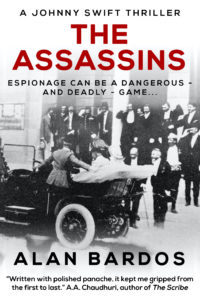 The The Assassins
The The Assassins
By Alan Bardos
(Blurb)
1914.
Tensions are reaching a boiling point in Europe and the threat of war is imminent.
Johnny Swift, a young and brash diplomatic clerk employed by the British embassy is sent to infiltrate the ‘Young Bosnians’, a group of idealistic conspirators planning to murder Franz Ferdinand. The heir to the Austro-Hungarian throne, in a bid to liberate their country from the monarchy’s grip.
Swift has been having an affair with his employer’s wife, Lady Elizabeth Smyth. Sir George Smyth dispatches the agent on the dangerous mission, believing that it will be the last he will see of his young rival.
The agent manages to infiltrate the Young Bosnian conspirators’ cell, helped by Lazlo Breitner, a Hungarian Civil Servant.
However, Swift soon realises that he may be in over his head. His gambling debts and taste for beautiful women prove the least of his problems as he struggles to survive on his wits in the increasingly complex – and perilous – world of politics and espionage.
Desperate to advance himself and with the lives of a royal couple unexpectedly in his hands, Swift tries to avert catastrophe.
Praise for Assassins
‘A cracking read, highly recommended’ – Roger A Price
‘Written with polished panache, it kept me gripped from the first to last. Five stars from me!’ – A.A. Chaudhuri
‘Part historical fiction, part thriller and part love story, this is a compelling and entertaining read’ – Gary Haynes
Buy Links:
This book is available to read for free with #KindleUnlimited subscription.
Audio Links:
US Audible  UK Audible
UK Audible  US Amazon
US Amazon  UK Amazon
UK Amazon

Alan Bardos is a graduate of the MA in TV Script Writing at De Montfort University. He also has a degree in Politics and History from Brunel University. Writing historical fiction combines the first great love of his life, making up stories, with the second, researching historical events and characters. Alan currently lives in Oxfordshire with his wife… the other great love of his life.
Despite the amount of material that has been written about the twentieth century there is still a great deal of mystery and debate surrounding many of its events, which Alan explores in his historical fiction series using a certain amount of artistic license to fill in the gaps, while remaining historically accurate. The series will chronicle the first half of the twentieth century from the perspective of Johnny Swift, a disgraced and degenerate diplomat and soldier; starting with the pivotal event of the twentieth century, the Assassination of Archduke Franz Ferdinand, in ‘The Assassins’.
Social Media Links:
Instagram  Facebook
Facebook  Twitter
Twitter  Goodreads
Goodreads  BookBub
BookBub  Amazon Author Page
Amazon Author Page

Instagram: @coffeepotbookclub
June 21, 2021
MERCEDES ROCHELLE THE USURPER KING COFFEE POT BOOK CLUB BLOG TOUR #HistoricalFiction #Plantagenet #HenryIV #BlogTour #CoffeePotBookClub @authorRochelle @maryanneyarde
It is my pleasure to feature Mercedes Rochelle as part of The Coffee Pot Book Club Blog Tour being held from May 11th – June 25th, 2021. Mercedes Rochelle is the author of the historical fiction novel, The Usurper King (The Plantagenet Legacy Book 3) which was recently released by Sergeant Press on April 5th, 2021 (308 pages).
Below are highlights of The Usuprper King, Mercedes Rochelle’s author bio, and my interview with her.
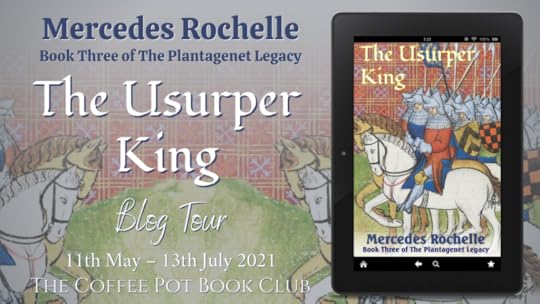
HIGHLIGHTS: THE USURPER KING
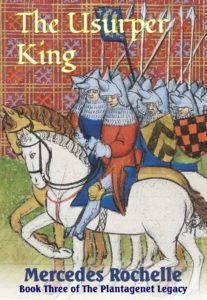
The Usurper King
(The Plantagenet Legacy, Book 3)
By Mercedes Rochelle
From Outlaw to Usurper, Henry Bolingbroke fought one rebellion after another.
First, he led his own uprising. Gathering support the day he returned from exile, Henry marched across the country and vanquished the forsaken Richard II. Little did he realize that his problems were only just beginning. How does a usurper prove his legitimacy? What to do with the deposed king? Only three months after he took the crown, Henry IV had to face a rebellion led by Richard’s disgruntled favorites. Worse yet, he was harassed by rumors of Richard’s return to claim the throne. His own supporters were turning against him. How to control the overweening Percies, who were already demanding more than he could give? What to do with the rebellious Welsh? After only three years, the horrific Battle of Shrewsbury nearly cost him the throne—and his life. It didn’t take long for Henry to discover that that having the kingship was much less rewarding than striving for it.
Buy Links:
AUTHOR BIO: MERCEDES ROCHELLE
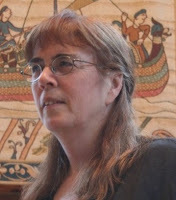
Mercedes Rochelle is an ardent lover of medieval history and has channeled this interest into fiction writing. Her first four books cover eleventh-century Britain and events surrounding the Norman Conquest of England. The next series is called The Plantagenet Legacy about the struggles and abdication of Richard II, leading to the troubled reigns of the Lancastrian Kings. She also writes a blog: HistoricalBritainBlog.com to explore the history behind the story. Born in St. Louis, MO, she received her BA in Literature at the Univ. of Missouri St.Louis in 1979 then moved to New York in 1982 while in her mid-20s to “see the world”. The search hasn’t ended! Today she lives in Sergeantsville, NJ with her husband in a log home they had built themselves.
Social Media Links:
Website  Blog
Blog  Facebook
Facebook  Twitter
Twitter  Book Bub
Book Bub  Amazon Author Page
Amazon Author Page  Goodreads
Goodreads
I’m delighted, Mercedes, that you’ve agreed to an interview as part of the Coffee Pot Book Club Blog Tour. Would you provide an overview of the books you’ve published in the Plantagenet dynasty?
Thank you, Linnea, for interviewing me today! This series begins with the life of Richard II in two volumes: A King Under Siege covers the first ten years of his reign and ends when he assumes his majority. First, he faced the terrifying Peasants’ Revolt at age fourteen—and demonstrates the bravery one would expect from the son of the Black Prince. Only a few years later his disgruntled barons unite against him and threaten him with usurpation. Through judicial murder they eliminate his foremost advisors and send the rest into exile; the lucky ones are simply dismissed. In The King’s Retribution he wreaks merciless revenge against his enemies, but in his anxiety to protect his crown Richard underestimates the very man who will take it from him: Henry Bolingbroke.
Please tell us more about your most recently released book, The Usurper King (The Plantagenet Legacy Book 3). Can this book be read as a standalone?
Book Three picks up the story of Henry Bolingbroke, starting with his exile in Paris. Taking advantage of Richard’s expedition to Ireland, Henry returns to England and swiftly gains support. His revolution is almost bloodless and his usurpation is a triumph. Unfortunately, only three months after the coronation, Henry IV has to face his first rebellion led by Richard’s disgruntled favorites. Repressive measures lead to more discontent. His own supporters turn against him, demanding more than he could give. The haughty Percies precipitated the Battle of Shrewsbury which nearly cost him the throne—and his life. To make matters worse, even after Richard II’s funeral, the deposed monarch was rumored to be in Scotland, planning his return. The man just wouldn’t stay down and malcontents wanted him back.
I did my best to make this a stand-alone, though naturally the nuances will be lost without having read the other books. If you know your Shakespeare, you won’t have any trouble!
What has inspired you to write historical fiction about medieval Britain?
Ironically, my college days, I stumbled across the SCA (Society for Creative Anachronism). They “recreate” the Middle Ages as it should have been (without the plague, that sort of thing). I knew nothing about the period, so I initially learned my history as a reenactor. I was an English major, so the writing part was already in place. Shortly afterward, I discovered Sharon Kay Penman, and the concept of historical fiction was really like a light bulb going off in my head!
How much research was involved in writing your books? How did you go ABOUT researching the history, language, myths and culture of medieval Britain to support your writing?
Decades of reading about the eleventh century for my first series gave me a good background. But when I jumped forward three hundred years, I had to start all over again. It took me a year of daily reading before I even started writing about Richard II. I’ve learned that the fat books (in page-length) are the best starting points. They give us a broad brush stroke (like a landscape painting) and create the structure for the story. The huge books tend to be sparse on details. Then I slowly get more specific, finding books that are more focused. By the time I delve into the academic articles, I am ready to sort out the fine details of a scene. These treatises are specific to a particular subject, so the author puts every bit of knowledge into an event (including all contradictory source material). JSTOR.org is a fabulous source for these articles. Of course, the reading never stops. After I’ve run my course as described above, I go back to the beginning and re-read the material to pick up all the stuff I missed the first time through. There’s a lot of it! I consumed well over 30 history books while writing the first two volumes of this series, and four loose-leaf binders full of articles.
Is there any sub-character in The Usurper King who is your favorite? Explain why.
I’m a sucker for the Percies, both father and son. Henry Percy, Earl of Northumberland was apparently an irascible fellow—ambitious, greedy, and opportunistic. At the same time, he was Henry’s most powerful noble, experienced in both warfare and negotiation. I think people were in awe of him. His son, Harry Hotspur, was apparently full of charisma, for you never read anything about him except glowing, wistful reverence. Yet he was hotheaded and impulsive, and I think he was driven by a misguided sense of honor. I find them both to be complicated characters.
How often do your characters surprise you by doing or saying something totally unexpected?
I admit that my characters don’t surprise me often, since I research the heck out of them. I already know what they are going to do. The most challenging part for me is finally having to decide why they did something. For instance, why did Edward, Earl of Rutland turn on his fellow conspirators at the last minute before the Epiphany Rising? Or did he? Shakespeare had his angle in the play Richard II, but I didn’t agree with him. Historians were all over the place. I waffled for weeks before I finally had to write that scene. It wasn’t until I was actually there that I had to commit myself. And at that moment (literally, he was at a crossroads), it’s true that I summoned up an incident from earlier in the novel that pushed him over the edge. I had almost forgotten how significant it was until I needed it. Once the decision was in place, it all made sense. Whew.
Have you received reactions/feedback to your work that has surprised you? In what way?
I should have expected this, but people who enjoyed my Anglo-Saxon novels were not nearly as excited about the 14th century as I was. Now I understand how musicians feel when their fans object to their evolving into a different style.
What are the most important traits you look for in a friend?
Creativity is high on my list. I noticed that the people I gravitate toward are usually open-minded and excited about learning new things. They want to talk about concepts, art, and literature. Like myself, they are not terribly interested in politics or everyday stuff.
If you could have one skill that you don’t currently have, what would it be?
I wish I had learned to ride a horse. I tried it for a while as an adult, but I think I was just too old to start (I was in my late thirties). By then, I was very timid about falling off; as a result, I could never get into jumping or even galloping. When you are young, you are fearless! (Or at least I think so, though to be honest, I was never really all that plucky.)
What simple pleasure makes you smile?
Anything to do with animals. I love bird watching and feeding the critters. I love gardening. I love walking in the woods. Camping! Maybe being a medieval person would have suited me after all (without the nasty stuff).

Instagram: @coffeepotbookclub



